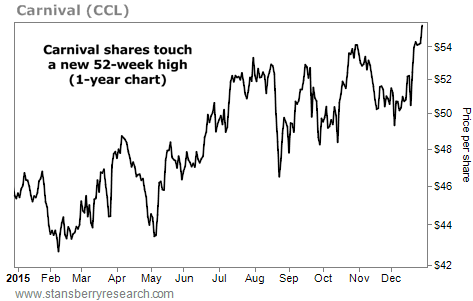| Home | About Us | Resources | Archive | Free Reports | Market Window |
When This Happens... the Average Stock More Than DoublesBy
Wednesday, December 30, 2015
When you go to buy a stock, you might ask yourself: Is this stock likely to go up?
But that's the wrong question.
You don't know whether it will go up or not. No point pretending.
The right question: Has this stock gone down enough?
Now, we're getting somewhere. Now, we're harnessing our natural, very becoming modesty and putting our ignorance to work for us. We don't know the future. But we can know the past.
And it is not for nothing that we are a friend to underdogs, diehards, and lost causes. It pays!
Thirty years ago, at an investment conference, there was a scalawag analyst from Germany. He showed a chart in which a stock had gone up steadily for 10 years. He pointed to the bottom-left section, and in a thick accent, explained his system:
"Ja, you see, down heer? Vee buy."
Then, pointing to the upper-right-hand corner opposite...
"Und up heer, vee sell. Zat vay vee never lose money."
A hand went up. A listener had a question:
"But what happens if the stock doesn't go up?"
"Ah, zen," he replied without a moment's hesitation, "vee don't buy it."
He was right. The winning formula is "Buy low. Sell high." And there's only one side of that formula you can completely control: buying low.
The way to make money from investments, above all else, is to buy the losers, not the winners.
Everybody stumbles. So the longer you see some hotshot walk down the street without stumbling, the greater your certainty that there's a banana peel waiting for him.
What you want are stocks that have already stumbled. Not ones that have some kind of serious motor problem... not brain damaged... not derelict companies or defunct technology stocks.
Of course, you want normal companies in decent health... but that have had a string of bad luck, or made some bad "life choices" and are now getting themselves back together.
You want something that is cheap.
Generally, buying cheap is the way to go.
And "quant" investor Mebane Faber, of Cambria Investment Management, proved it.
Faber did a study of, roughly, the past 100 years. He wanted to know what happened when the stock market fell on its face. Specifically, after stocks had gone down for three consecutive years... what next?
A year or two is usually all it takes to correct mispricing. So, a three-year slide is rare. But when it has happened, there has almost always been a powerful bull market afterward, with an average gain in the fourth year of 30%.
Faber further studied industry groups, sectors, and overseas stock markets. Everywhere, he found the same phenomenon: When a market had gone down enough, it was ready for a big move to the upside.
When U.S. industry sectors, for example, had dropped 80% or more, the average return over the next three years was 170%.
Foreign stock markets: Same thing. If they went down 80% or more, they'd have an average gain of 118% three years later.
So, what is down 80% today? What's despised? Where are the losers? Gold? Commodities? Emerging markets?
Here's one that stands out: Greece.
Talk about a loser!
Greek stocks are down 98%, in U.S. dollar terms, since 2007. That is a record of investment failure and extreme loss that is hard to beat. What are the odds that Greek stocks will be substantially higher three years from now?
We don't know. Wrong question. All we know is that you get a lot of stock for your money. That's all we really know. And all we need to know.
What else?
Russia!
The dividend yield on the Russian stock market is about 4% to 5%. And the average Russian stock is selling at about half its liquidation value, with the market down from 2008, even in ruble terms.
Russian stocks may not rise in 2016. Or 2017. But they're bound to go up sometime.
And if they don't...
... don't buy them.
Regards,
Bill Bonner
Further Reading:
Last month, we shared a special two-part series from Bill. It was an insightful look at what you should do if you're running out of time and money. Read both parts of his "Baby Boomer Survival Guide" here and here.
"The entire edifice of federal regulation and policing is a scam – at least when it comes to the stock market..." Bill says. He explains why the Fed's decision to ban insider trading didn't level the playing field... It tilted it even more in the insiders' favor. Learn more here: Why ALL Insider Trading Should Be Made Legal.
Market Notes2015 YEAR IN REVIEW: A STRONG FINISH FOR THIS IMPORTANT ECONOMIC INDICATOR We've updated readers many times this year on the state of the U.S. economy, and there has been one clear takeaway... things can't be all that bad.
Regular readers know we like to keep an eye on businesses that gauge the "temperature" of the U.S. economy. And while things aren't totally rosy, they aren't as bad as some folks would have you believe. This year, we've noted the new highs in shares of ski-resorts operator Vail Resorts, payroll-processing firm Automatic Data Processing, and 3D-movie theater IMAX, just to name a few. Another company we use as an economic gauge is cruise line Carnival (CCL).
Carnival is a classic "spending stock." If the economy is in the tank, folks won't have much money to spend on cruises. If the economy is doing well, they'll be more willing to shell out plenty of money to party on the seas.
Carnival's performance over the course of the year suggests the economy is chugging along just fine. Shares are up nearly 25% over the past eight months and are trading at their highest level in almost 10 years...
 |
Recent Articles
|



